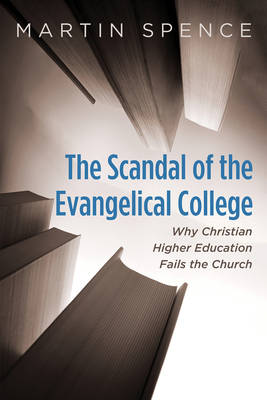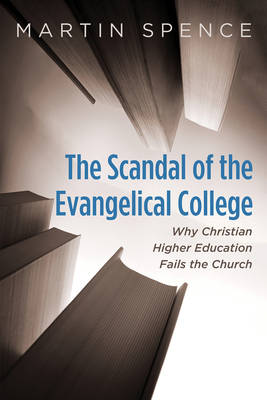
Bedankt voor het vertrouwen het afgelopen jaar! Om jou te bedanken bieden we GRATIS verzending (in België) aan op alles gedurende de hele maand januari.
- Afhalen na 1 uur in een winkel met voorraad
- In januari gratis thuislevering in België
- Ruim aanbod met 7 miljoen producten
Bedankt voor het vertrouwen het afgelopen jaar! Om jou te bedanken bieden we GRATIS verzending (in België) aan op alles gedurende de hele maand januari.
- Afhalen na 1 uur in een winkel met voorraad
- In januari gratis thuislevering in België
- Ruim aanbod met 7 miljoen producten
Zoeken
The Scandal of the Evangelical College
Why Christian Higher Education Fails the Church
Martin Spence
€ 48,95
+ 97 punten
Uitvoering
Omschrijving
Despite heady claims about Christ-centeredness, Evangelical colleges are scandalously secular institutions, in thrall to the regnant assumptions of the market economy and mainstream higher education. Paradigms intended to "integrate faith and learning" often ironically fracture and distort Christianity. Even the "spiritual" dimensions of the Christian college, presumed to keep it safe from religious declension, are prone to secularizing tendencies because the American Evangelical culture from which the college receives its spiritual cues--and from which it accepts its donors' money--is itself captive to a set of sub-biblical economic, social, and political assumptions. This book argues that the cause of the scandal is the absence of the church in the imagination of the Evangelical college. It therefore proposes that the mission and practice of the Evangelical college should be to summon, equip, and renew the people of God. While this may sound like a return to an obsolete bible school model of Christian education, the ecclesial vision only sounds narrow because we lack a robust understanding of the vocation of the church itself. By simultaneously restricting our vision of the Evangelical college while broadening our understanding of the church, a more fully evangelical educational endeavor might emerge.
Specificaties
Betrokkenen
- Auteur(s):
- Uitgeverij:
Inhoud
- Aantal bladzijden:
- 138
- Taal:
- Engels
- Reeks:
Eigenschappen
- Productcode (EAN):
- 9781666789294
- Verschijningsdatum:
- 30/06/2025
- Uitvoering:
- Hardcover
- Formaat:
- Genaaid
- Afmetingen:
- 152 mm x 229 mm
- Gewicht:
- 358 g

Alleen bij Standaard Boekhandel
+ 97 punten op je klantenkaart van Standaard Boekhandel
Beoordelingen
We publiceren alleen reviews die voldoen aan de voorwaarden voor reviews. Bekijk onze voorwaarden voor reviews.









